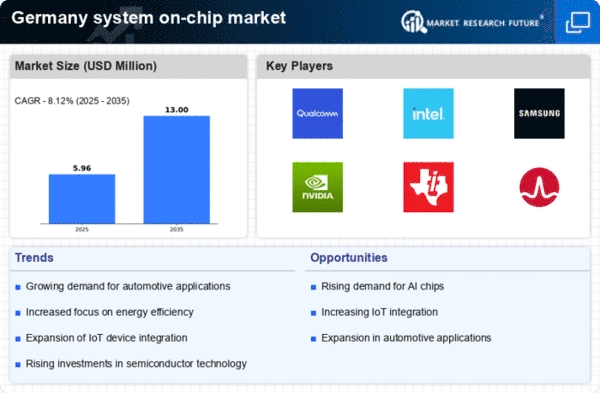Emergence of 5G Technology
The rollout of 5G technology in Germany is poised to transform the system on-chip market. With the promise of faster data speeds and lower latency, 5G networks are expected to drive demand for advanced system on-chip solutions that can support high-performance applications. In 2025, the 5G segment is anticipated to account for around 25% of the system on-chip market. This shift necessitates the development of chips capable of handling increased data traffic and enabling seamless connectivity across devices. As telecommunications companies invest in infrastructure to support 5G, the system on-chip market is likely to experience significant growth, fostering innovation and competition among manufacturers.
Growth in Automotive Electronics
The automotive sector in Germany significantly influences the system on-chip market, as the industry increasingly adopts advanced electronic systems. With the rise of electric vehicles (EVs) and autonomous driving technologies, the demand for sophisticated system on-chip solutions is expected to escalate. In 2025, the automotive electronics segment is anticipated to represent around 30% of the system on-chip market. This growth is attributed to the need for enhanced safety features, infotainment systems, and connectivity solutions. As automotive manufacturers prioritize innovation, the integration of system on-chip technology becomes essential for meeting regulatory standards and consumer expectations, thereby driving market expansion.
Rising Demand for Mobile Devices
The system on-chip market in Germany experiences a notable surge in demand for mobile devices, driven by the increasing reliance on smartphones and tablets. As consumers seek more powerful and efficient devices, manufacturers are compelled to integrate advanced system on-chip solutions. In 2025, the mobile device segment is projected to account for approximately 45% of the overall system on-chip market. This trend indicates a shift towards compact, high-performance chips that can support complex applications, enhancing user experience. Furthermore, the proliferation of mobile applications necessitates the development of specialized chips that can handle diverse functionalities, thereby propelling innovation within the system on-chip market.
Investment in Research and Development
Germany's commitment to innovation and technology advancement plays a crucial role in shaping the system on-chip market. The government and private sector are investing heavily in research and development (R&D) initiatives aimed at fostering technological breakthroughs. In 2025, R&D expenditure in the semiconductor sector is projected to reach €5 billion, reflecting a robust focus on developing next-generation system on-chip solutions. This investment is likely to enhance the competitive landscape, enabling local companies to innovate and improve their product offerings. As a result, the system on-chip market is expected to benefit from a continuous influx of cutting-edge technologies, positioning Germany as a leader in the semiconductor industry.
Increasing Demand for Smart Home Devices
The rise of smart home technology significantly impacts the system on-chip market in Germany. As consumers increasingly adopt smart home devices, the need for efficient and compact system on-chip solutions becomes paramount. In 2025, the smart home segment is projected to contribute approximately 20% to the overall system on-chip market. This growth is driven by the integration of IoT capabilities in home appliances, security systems, and energy management solutions. Manufacturers are focusing on developing chips that can seamlessly connect and communicate, enhancing the functionality of smart home devices. Consequently, the system on-chip market is likely to witness substantial growth as it adapts to the evolving demands of consumers.















